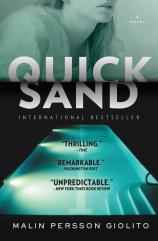Quicksand
Review
Quicksand
School shootings --- and mass shootings in general --- seem all too common in the United States, but they never truly lose their potential for horror. That’s especially true in QUICKSAND, which is notable because the school shooting at the center of this award-winning novel takes place not in the United States but in Sweden (the book was named Best Swedish Crime Novel of the Year).
QUICKSAND is narrated exclusively from the point of view of Maja Norberg, who, we learn very soon after the novel’s opening, is on trial following the shooting of her teacher and several of her classmates at their exclusive prep school. Maja, who lives in a wealthy suburb of Stockholm, is accused not only of conspiring with her boyfriend Sebastian (who died in the incident) to stage the attack but also of being directly responsible for two deaths and, just possibly, by using a series of text messages to incite the violence in the first place.
"QUICKSAND is simultaneously a gripping courtroom novel...and an intimate portrayal of a young woman in crisis... Her voice...is captured elegantly by Rachel Willson-Broyles’ fluid translation from the Swedish."
The narrative jumps back and forth chronologically --- from tense scenes in the courtroom, during which Maja alternates between boredom, anxiety and self-doubt, to glimpses of her prison life in near-total isolation, to her own account of the events that led up to the shootings. Maja never disputes her role in the massacre, but as she narrates the history of her relationship with Sebastian as well as with the other students involved, readers soon discover that events are rarely as simple or straightforward as they seem on the surface.
QUICKSAND is simultaneously a gripping courtroom novel (the lead defense lawyer, who offers a mixture of grandfatherly concern and blistering legal acumen, is particularly memorable) and an intimate portrayal of a young woman in crisis, trapped, it turns out, between loyalties and finding herself nearly powerless --- even up to the final moment --- to know how to do the right thing. Her voice --- raw, vulnerable and possibly unreliable --- is captured elegantly by Rachel Willson-Broyles’ fluid translation from the Swedish.
Near the end of the novel, Maja’s voice shifts somewhat unexpectedly, turning on readers (who is, in a way, the de facto jury for her case) and addressing them directly: “You all probably won’t even remember how this trial ends, whether I’m found guilty, or what I’m found guilty of. You’ll be talking about me at some party in a few years and say, That’s what happened or She wasn’t even charged with that or That’s weird. Are you sure? I think she… My truth will soon exist nowhere but in the binders full of material from my trial, archived in a cold basement.” This narrative shift can be jarring, but significantly so, calling readers’ attention to the judging they’ve been doing all along, forcing them to confront their own assumptions and prejudices even as they delve deep into Maja’s surprising and, at times, troubling account.
Reviewed by Norah Piehl on March 10, 2017





